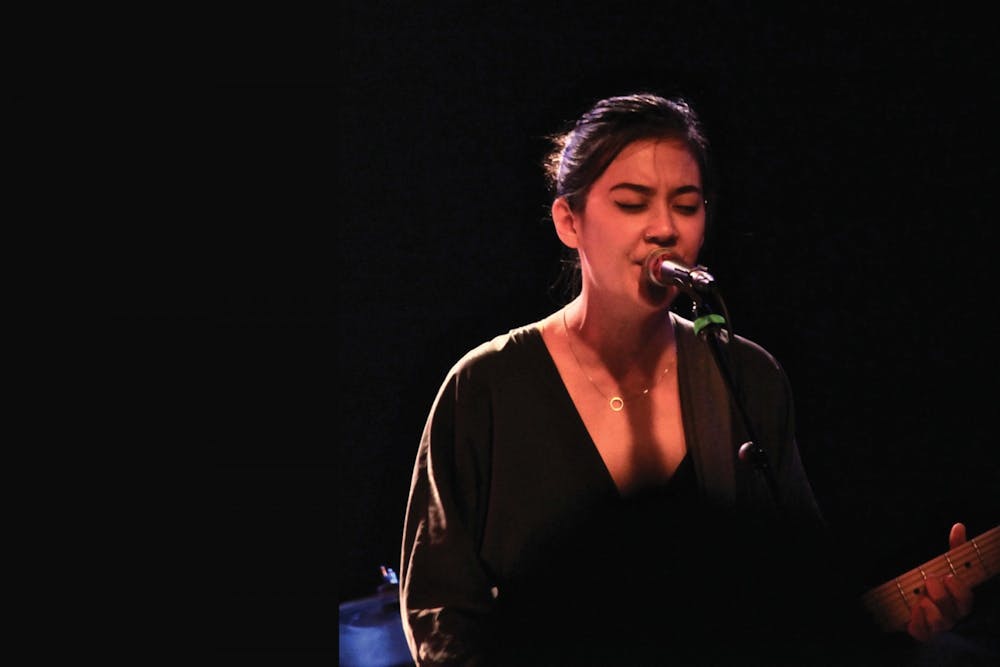What happened to the guitar solo? In the early 2000s, what was once a standard feature of radio hits became confined to the provenance of white male indie rock. Bands like Wilco and My Morning Jacket kept guitar solos alive, but by the year 2010, indie artists were faced with a decision between the new frontier of pop and the rock music that was suddenly out of date. Titus Andronicus’ sprawling Springsteen–homage The Monitor was lauded on release, but would only place at #194 on Pitchfork’s 200 Best Albums of the 2010s. Or, one could take the Destroyer approach, embrace sophistipop and synthpop, and produce the most lauded work of their career. On her new album Jubilee, Japanese Breakfast's Michelle Zauner doesn’t obligate herself to choose between the new and old indie canons. She finds joy in having her cake and eating it too.
More than just an “album about joy,” the psychological landscape of Jubilee encompasses a complex range of emotions. But should we expect anything else? Japanese Breakfast was conceived by Zauner as a songwriting project to process the death of her mother from cancer. Psychopomp, her first album under the moniker, opened with the heartbreaking lyric “The dog’s confused.....She’s sniffing at your empty room.” That couplet comes from the song “In Heaven,” which finds a counterpart on Jubilee with “In Hell.” Over a bed of lush guitars and synths, she sings that “With my luck you’ll be dead within the year / I’ve come to expect it.” Throughout, Zauner excavates the grief and trauma she has overcome to lend gravitas to her joy.
There are certainly moments of pure euphoria across the record. Opener “Paprika” is driven by martial snares and a triumphant brass section, which perfectly capture the rush Zauner describes of being “at the height of [her] powers.” Jubilee is an accomplished album, one that is also consciously aware of its accomplishment. Japanese Breakfast never strays far from the dark, a theme exemplified in the track “Savage Good Boy” which embodies ambition in excess. Zauner also studied piano and took music theory classes in between this and her previous record, and her orchestral compositions manifest prestige. “Tactics,” a ballad in dedication to her father, features string accompaniment and electric piano that are reminiscent of Mitski’s “Two Slow Dancers.”
Jubilee is situated amongst the legacy of many other accomplished indie albums; Be The Cowboy is only one of many possible reference points. In an interview with The Ringer, Zauner specifically cited other third records by Wilco and Björk (Summerteeth and Homogenic, respectively). She describes the third album as the “time to...assert who you are...and open up the world to other musicians that you know.” Her music has always displayed its influences reverently without coming off as derivative or unoriginal, and the songs on Jubilee are no exception. “Slide Tackle” makes use of the same smooth jazz saxophones as Kaputt, the aforementioned Destroyer album. And Zauner’s breathy vocals on shoegaze slow–burner “Sit” recall Karen O, who she has cited as an inspiration, as well as the Yeah Yeah Yeahs album It’s Blitz.
Japanese Breakfast has always been concerned with reinvention as much as with invention, and for Michelle Zauner, that includes her own back catalog. The version of “Boyish” from 2017’s Soft Sounds from Another Planet was actually the song’s third iteration. There’s a similar legacy behind “Posing in Bondage,” the mid–album centerpiece of Jubilee. “Posing in Bondage” was originally released as the b–side to a Polyvinyl 4–Track Single. Here, it is given space to expand into something immense. A clicking drum machine becomes a near–industrial breakdown. Zauner’s singing, once deep buried in the mix, echoes and splits into disembodied voices. The song shimmers, twinkles, and pulsates, like light that’s been trapped and reflected through a prism.
There’s a warm glow that permeates Jubilee and holds these songs together. It’s what allows the ebullient city–pop of “Be Sweet” to sit next to the swooning “Kokomo, IN.” The latter track is one of the finest songs Michelle Zauner has ever written, backed by slide guitar that falls somewhere between Brian Wilson and hometown hero Isaac Brock of Modest Mouse. Those smooth, consistent surfaces do yield weaker moments. Most notably, “In Hell” could benefit from some of the raucous, emo–adjacent energy that powered “12 Steps” or “Rugged Country.” But even if Jubilee isn’t even the best Japanese Breakfast album (that would be Soft Sounds), it’s easily the best album of 2021 so far. It’s also the best album for 2021, a year of joy borne from collective trauma.
We now return to the guitar solo–specifically the one that fills the entire second half of slowcore album closer “Posing For Cars.” The motif of “posing” appears across Jubilee. It’s an apt descriptor for Zauner’s carefully composed written tableaus. But the lyrics on “Posing For Cars” give way quickly, and she lets her instrument do the talking. This guitar solo is a study in tension and dynamics. It is a rupture in the smooth surface. It’s all slippery motion. Its closest modern reference point is “Strangest Thing” by The War On Drugs, themselves a vestige of the white rock auteur. Thus, Michelle Zauner embraces the indie canon once more and then reclaims it for herself. But just like Jubilee isn’t just about joy, she’s not just an indie rock musician. She’s everything she wants to be all at once.

